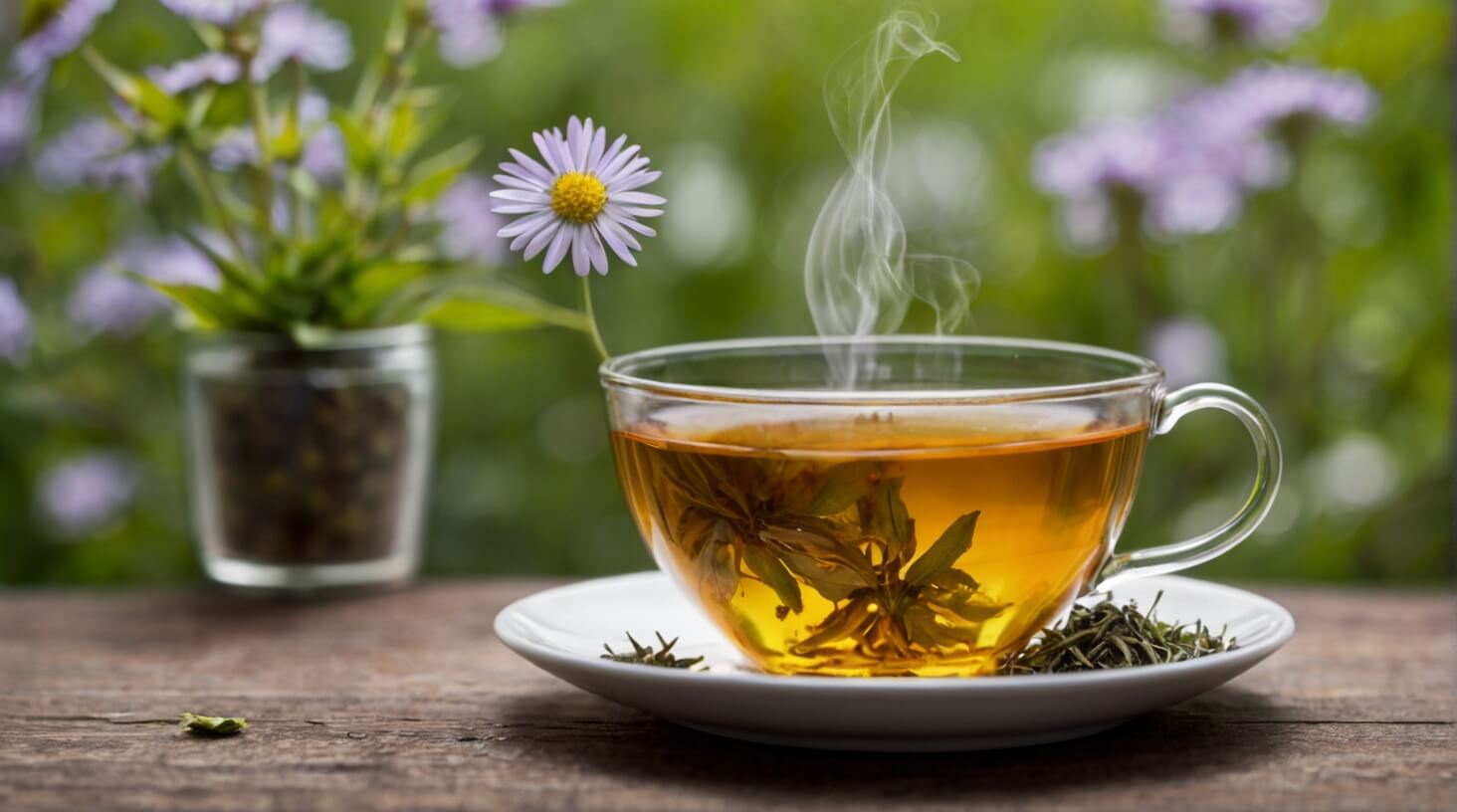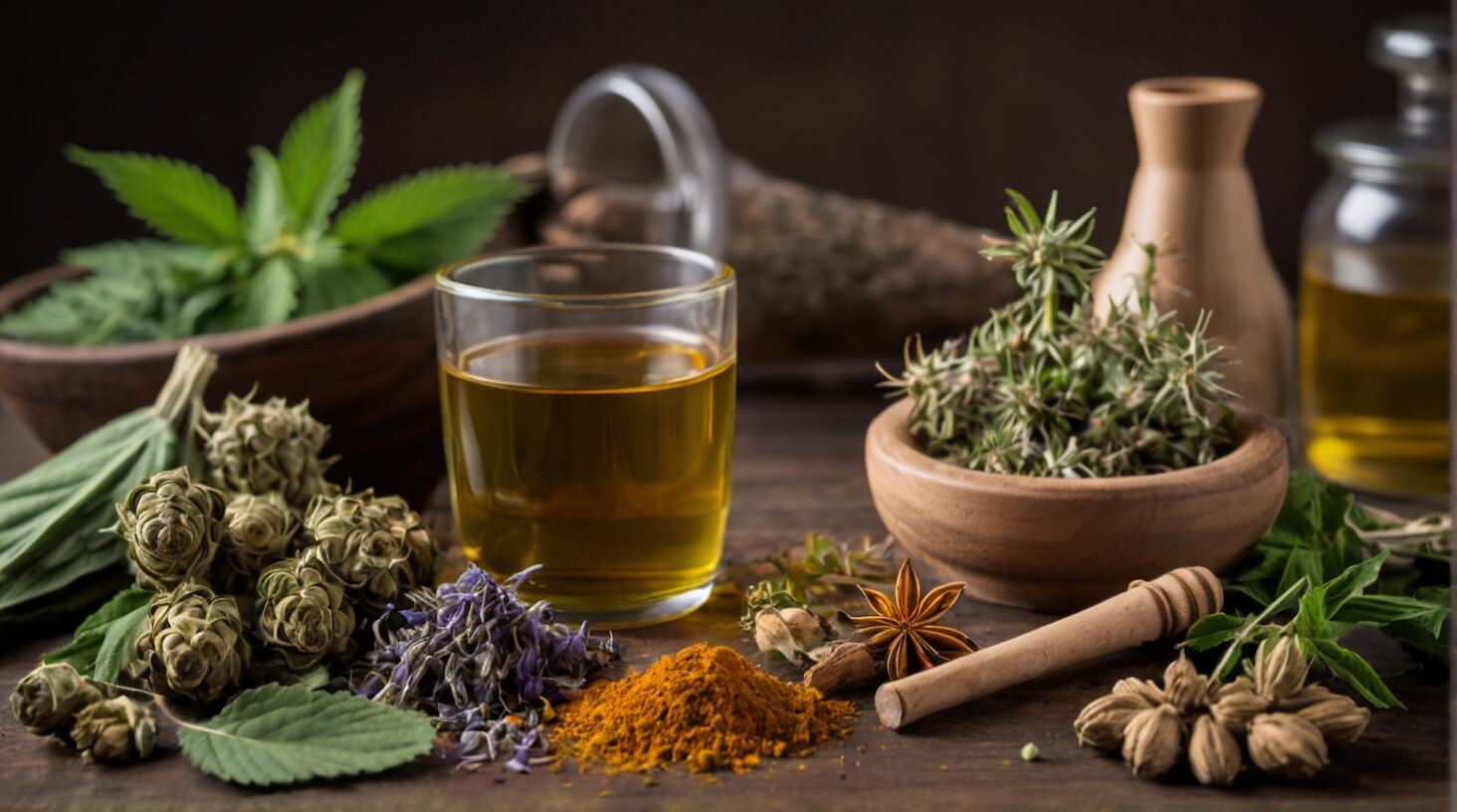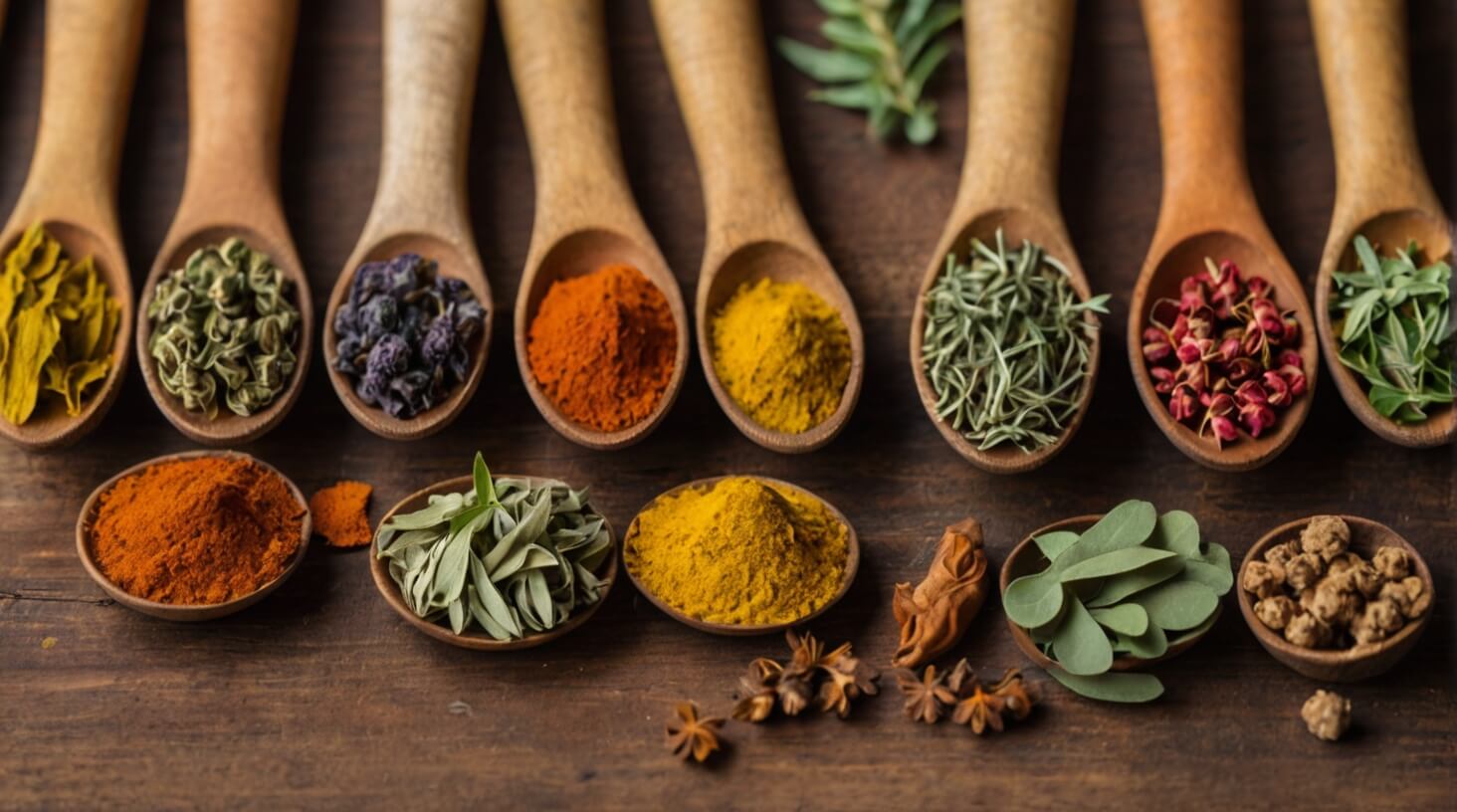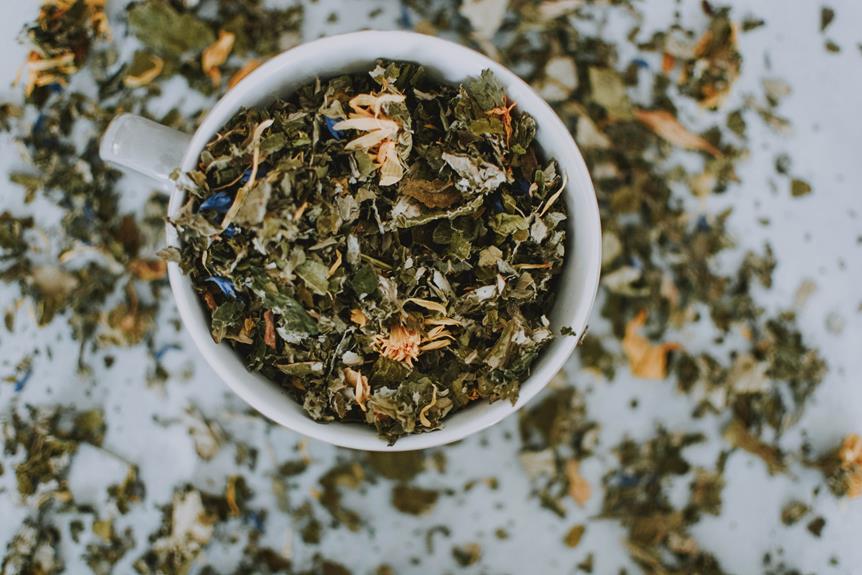Have you ever considered how your daily cup of herbal tea might be doing more for you than just providing a moment of tranquility? As you sit back with your steaming mug, the delicate dance between plant-derived compounds and your body’s immune system begins. You’re aware that a robust immune response is vital for warding off illnesses, but the subtleties of how natural remedies like herbal teas can influence this complex system might not be as clear. While you’re not looking for a miracle cure, you can’t help but be curious about the potential that these age-old beverages hold in supporting your body’s defenses. In your hands, perhaps, lies not just comfort, but also a key to unlocking the secrets of enhanced well-being. Let’s explore the intersection of tradition and science, where the leaves steeping in your cup intersect with the cells patrolling your system, and consider what’s yet to be discovered at the crossroads of herbal wisdom and immune health.
Key Takeaways
- Herbal teas contain bioactive components that can influence the immune response.
- Phytochemicals in herbal teas enhance the body’s innate and adaptive immune responses.
- Herbal teas have the potential to modulate the body’s defense mechanisms.
- Green tea supports the immune system, offers anti-inflammatory benefits, and combats oxidative stress.
Understanding Immune Response
To grasp the complexities of your body’s defense system, it’s essential to recognize that the immune response is a multifaceted mechanism involving both innate and adaptive immunity, each with distinct roles in identifying and neutralizing foreign threats. Your innate immunity serves as the first line of defense, rapidly responding to invaders with a generic attack. It’s non-specific, meaning it doesn’t recognize specific pathogens but provides immediate protection. Meanwhile, adaptive immunity is more specialized; it involves immune cells like T and B lymphocytes that target and remember specific antigens, ensuring a robust and swift response upon reencounter.
As you explore ways to boost your immune system, you’ll discover the health benefits of Herbal Teas. Unlike traditional teas derived from Camellia sinensis, herbal teas encompass a variety of bioactive components from different plants. These components, including tea polyphenols in traditional teas and various compounds in herbal varieties, are studied for their effects on the immune response.
One of the potent compounds found in tea extracts, particularly from green tea, is epigallocatechin gallate (EGCG). Known for its significant antioxidant activity, EGCG is a subject of interest due to its potential to modulate immune function. Antioxidants like EGCG are crucial in combating oxidative stress, which can impair immune cells’ functionality.
Your understanding of how to leverage the effects of tea, including the selection of appropriate tea extracts, can play a pivotal role in serving others who seek natural approaches to health maintenance. By delving into the immunomodulatory properties of herbal teas, you’re equipped to provide informed recommendations that may help individuals reinforce their immune health.
Herbal Teas as Immune Modulators

Delving into the realm of herbal teas reveals their potential as immune modulators, with various polyphenol antioxidants and phytochemicals acting to fine-tune the body’s defense mechanisms. Herbal medicine is no stranger to health, with a legacy of using plant-derived compounds to maintain well-being and treat ailments. As you explore the health conditions that may benefit from herbal teas, you’re tapping into an ancient, yet still-relevant, form of healing.
Studies have consistently highlighted that tea contains a rich array of compounds capable of modulating immune function. These include flavonoids and catechins, which are known to combat inflammation and stimulate an anti-inflammatory response. This is crucial, as chronic inflammation is a common thread linking many health conditions, from cardiovascular disease to autoimmune disorders.
Tea consumption, particularly of varieties like green tea, ginger tea, and hibiscus tea, has been connected to reductions in pro-inflammatory cytokines. These cytokines are signalling proteins that can exacerbate inflammation when produced in excess. By influencing the cytokine balance, herbal teas may help to reduce the risk of inflammation-related diseases.
Moreover, the phytochemicals in herbal teas can enhance the body’s innate and adaptive immune responses. This means that your immune cells may become more efficient at identifying and eliminating pathogens, while also improving the precision with which they avoid attacking your own tissues.
Antioxidant Properties of Herbal Infusions
Building on the immune-modulating benefits of herbal teas, it’s important to examine how their rich antioxidant properties can shield your body from oxidative stress and its associated health risks. Herbal infusions offer a diverse spectrum of bioactive phytochemicals that serve as a robust defense against the detrimental effects of reactive oxygen species. By delving into the antioxidant capabilities of these infusions, you can better understand how to integrate them into your regimen to serve the health needs of others.
Here’s what you need to know about the antioxidant properties of some popular herbal infusions:
- Green Tea: Rich in polyphenols like EGCG, green tea is renowned for its strong antioxidant properties. It can attenuate oxidative stress, which in turn supports the immune system and offers anti-inflammatory benefits.
- Hibiscus Tea: This vibrantly colored infusion is loaded with anthocyanins and other antioxidants, contributing to its potential health benefits, including blood pressure regulation and overall cardiovascular health.
- Ginger Tea: With its active component gingerol, ginger tea is an antioxidant powerhouse that may also help alleviate nausea and inflammation.
- Chamomile Tea: Known for its calming effects, chamomile contains antioxidants that may provide anti-inflammatory and cancer-fighting health benefits.
These herbal infusions, each with their unique blend of antioxidant properties, serve as a testament to the therapeutic potential of nature’s bounty. By incorporating these teas into a health-focused lifestyle, you’re not just enjoying a soothing cup of warmth; you’re actively engaging in a preventive strategy against the pervasive threat of oxidative stress. In doing so, you’re not only nurturing your own well-being but also empowering others to take proactive steps towards a healthier life.
Anti-Inflammatory Herbal Brews

Amidst the myriad of health benefits herbal teas offer, their anti-inflammatory properties stand out as a key contributor to bolstering your immune system and combating inflammation. Delving into the specifics, green tea and hibiscus tea are prime examples of anti-inflammatory herbal brews with the potential to significantly impact health and the prevention of chronic ailments such as cardiovascular diseases and neurodegenerative diseases.
These teas contain polyphenol antioxidants, which are pivotal in their mechanisms of action against inflammation. The phytochemicals found in tea, like gingerol in ginger tea or apigenin in chamomile tea, help modulate the inflammatory response, thereby aiding your body to fight off inflammation. Furthermore, these compounds can regulate autophagy, a process that maintains cellular homeostasis and is essential for your body’s defense against various stressors.
As someone committed to serving others, understanding how these herbal infusions contribute to health is invaluable. By recommending these teas, you can assist in managing and potentially preventing the escalation of inflammatory conditions. The antioxidative and anti-inflammatory properties optimize the immune function, providing a complementary approach to traditional medical treatments.
Immune-Supportive Phytochemicals
While anti-inflammatory herbal brews like green and hibiscus tea guard against inflammation, it’s the immune-supportive phytochemicals within these teas that are the true heroes in fortifying your body’s defenses. You’ve likely heard about the health benefits of green tea, and study after study has shown that its high level of antioxidants, specifically EGCG (epigallocatechin gallate), plays a significant role in supporting the immune system. Green tea, along with its counterparts oolong tea and white tea, contain higher concentrations of EGCG, which is instrumental in enhancing immune function.
Here are some of the key phytochemicals in herbal teas that contribute to a robust immune system:
- EGCG: Predominant in green tea, EGCG has been shown to interact with the mitogen-activated protein kinase pathway, pivotal in immune response regulation.
- Gingerol: Found in ginger tea, gingerol possesses disease-fighting properties that can boost your immune health.
- Anthocyanins: Hibiscus tea is rich in these antioxidants, which studies have shown to offer significant immune-boosting benefits.
- Flavonoids: Present in chamomile tea, flavonoids contribute to the tea’s ability to support the immune system.
Furthermore, these teas often contain gallic acid, a potent phytochemical with acknowledged health-promoting properties. The detailed mechanisms by which these compounds support your immune system include the activation of specific cell lines and the enhancement of your body’s natural defense systems against pathogens. As you serve others and prioritize their well-being, integrating these herbal teas into daily routines can be an effective and natural way to support immune health.
Balancing Immunity With Herbal Variety

Diversifying your tea selection can enhance your immune system’s ability to protect your body, as different herbal teas offer a range of polyphenol antioxidants that contribute to overall health and immune balance. Each type of tea, derived from various tea plants, contains unique phytochemicals that play a role in regulating autophagy, a process critical for balancing immunity and preventing health problems.
When you’re looking to serve others, understanding the variety of health benefits associated with different types of tea can be invaluable. For instance, green tea is renowned for its high level of antioxidants, which can aid in mitigating oxidative stress and bolstering the immune response. Hibiscus tea, on the other hand, is associated with heart health and has been found to support healthy blood pressure levels.
Here’s a detailed table to illustrate the diversity of benefits associated with some common herbal teas:
| Tea Type | Main Benefit | Antioxidant Level |
|---|---|---|
| Green Tea | Enhances immune response | High |
| Hibiscus Tea | Supports cardiovascular health | Moderate |
| Ginger Tea | Aids digestion, anti-inflammatory | Moderate |
| Chamomile Tea | Promotes relaxation, sleep aid | Low |











